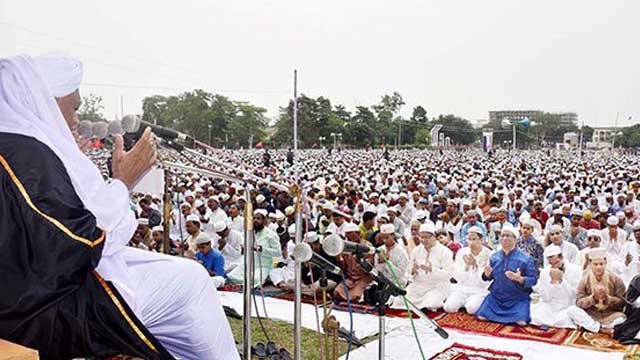The government today issued a gazette notification easing the ongoing restrictions from Thursday ahead of Eid-ul-Azha and allowing Eid-ul-Azha congregations at Eidgahs or other open places across the country, maintaining health guidelines amid the worsening Covid situation.
The move is an exception to the last three Eid festivals when the government had urged the Muslim devotees to avoid Eidgahs or other open places for Eid congregations and offer prayers at mosques health guidelines including maintaining physical distancing and using masks and hand sanitisers.
Eid-ul-Azha, one of the biggest festivals of Muslims, will be celebrated on July 21.
The religious affairs ministry said that the decision for Eid-ul-Azha congregations in mosques, Eidgahs and other open places should be finalised through discussions with local public representatives and respected persons of the areas and maintaining the Covid health guidelines.
Earlier on the day, the Cabinet Division issued a circular relaxing the ongoing restrictions on public movement and businesses from July 14 midnight to July 23 morning for the Eid celebration and pre-Eid economic activities despite experts’ concerns that such relaxation would cause further deterioration in the Covid situation.
Earlier, the government was advocating that instead of Eidgahs or open spaces, people should perform Eid prayers in mosques nearest to them. If necessary, more than one congregation can be held in the same mosques.
People are also requested to avoid hugging and shaking hands at the end of congregations to prevent the spread of coronavirus infection.
According to the notice, soap and hand sanitiser should be kept at the place of ablution in the mosques or Eidgahs. Hand sanitiser, soap and water for handwashing should be kept at the entrances of the mosques as well.
Everyone has to perform ablution at their home before coming to the mosques. When performing ablution, everyone should wash their hands with soap for at least 20 seconds, said the notice.
Worshippers must come to the mosques or Eidgahs wearing masks to attend Eid prayers. When standing in queue during Eid congregations, everyone must follow the social distancing rules as well as that of hygiene.
Children, elderlies, anyone who is sick and anyone engaged in the service of the sick are not allowed to participate in the Eid prayers.
To ensure public safety, the guidelines of the Directorate General of Health Services, local administration and law enforcement must be followed.





